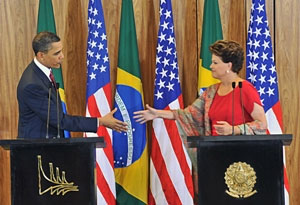Energy was part of the agenda when President Obama visited Brazil over the weekend.
 During his visit, Obama and Brazil’s President Dilma Rousseff agreed to launch a Strategic Energy Dialogue, to focus on both oil and biofuels. “Now even as we focus on oil in the near term, we shouldn’t lose sight of the fact that the only long-term solution to the world’s dependence on fossil fuels is clean energy technology,” Obama said in his address at the at CEO Business Summit in Brasilia, Brazil. “And that’s why the United States and Brazil are deepening our cooperation on biofuels and why we’re launching a U.S.-Brazil Green Economy Partnership, because we know that the development of clean energy is one of the best ways to create new jobs and industries in both our nations.”
During his visit, Obama and Brazil’s President Dilma Rousseff agreed to launch a Strategic Energy Dialogue, to focus on both oil and biofuels. “Now even as we focus on oil in the near term, we shouldn’t lose sight of the fact that the only long-term solution to the world’s dependence on fossil fuels is clean energy technology,” Obama said in his address at the at CEO Business Summit in Brasilia, Brazil. “And that’s why the United States and Brazil are deepening our cooperation on biofuels and why we’re launching a U.S.-Brazil Green Economy Partnership, because we know that the development of clean energy is one of the best ways to create new jobs and industries in both our nations.”
The two presidents noted the progress achieved under the Memorandum of Understanding to Advance the Cooperation on Biofuels and stressed “the importance of mobilizing public and private research institutions in the two countries to intensify cooperation in developing innovative technologies to produce advanced biofuels, and committed to enhance the bilateral and multilateral dialogue on sustainable production and use of bioenergy.” They also expanded the existing MoU to include the Partnership for the Development of Biofuels for Aviation, with the goal of developing sustainable aviation biofuels.
President and CEO of the Brazilian Sugarcane Industry Association (UNICA), Marcos Jank, was able to witness some of the Obama visit to Brazil firsthand and noted that several companies are developing aviation fuels based on sugarcane, including a three-way partnership between Brazilian regional jet manufacturer Embraer, engine manufacturer General Electric and California biotech company Amyris. In 2012, the trio intends to stage the first-ever flight using jet fuel produced from sugarcane, using an Embraer aircraft equipped with GE engines and owned by Brazil’s Azul Airlines.
“These developments add to the signs of growing awareness we’ve been witnessing in the United States in recent months about the need to develop clean energy solutions cooperatively and reduce barriers to its trade and development. Even avid supporters of heavy subsidies and steep tariffs that prevent Brazilian ethanol from entering the U.S. market competitively are now openly discussing what happens next, both in terms of technologies and policy. Without admitting it, they’re in fact recognizing that the current situation can’t last much longer because it works against everyone’s best interests. U.S. consumers are being denied access to clean, renewable Brazilian sugarcane ethanol, which could be contributing to lower greenhouse gas emissions and save Americans money at the pump,” said Jank.

